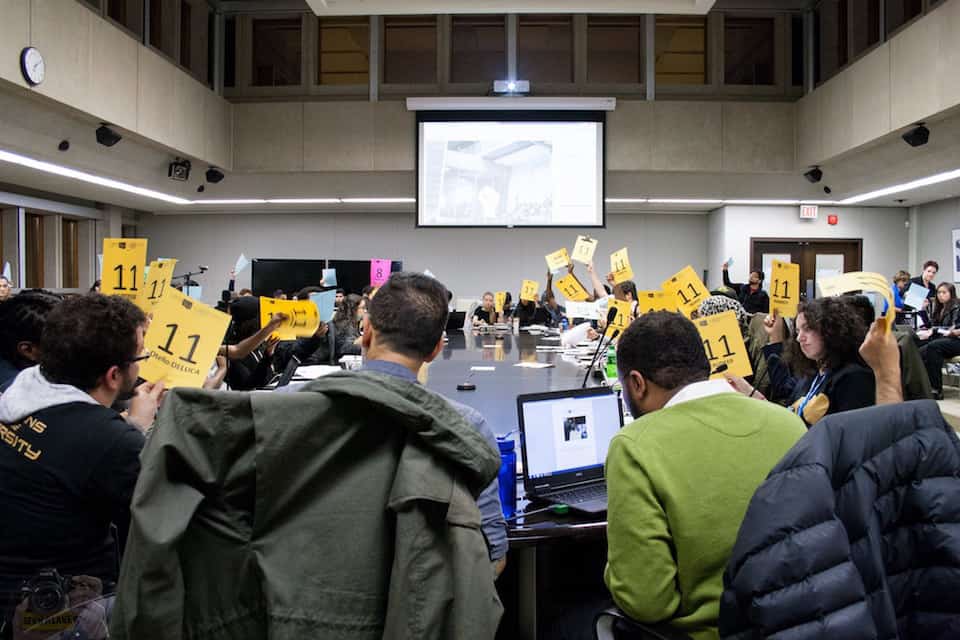Financial status, new initiatives, and services were the prime talking points at the University of Toronto Mississauga Students’ Union (UTMSU) Annual General Meeting (AGM). The November 12 meeting also offered an opportunity for UTM students to discuss proposed projects and potential changes to the union.
INITIATIVES AND SERVICES
Some of the major achievements discussed at the AGM were the addition of a second student to the World University Service of Canada (WUSC) program, a partnership with youth employment services to help recent graduates with job prospects, the opening of UTM’s first student-run convenience store, and the first mature students’ orientation.
In the past, the WUSC program has always been able to secure a space for one refugee student at UTM, who is granted an all expenses paid four-year stay on campus.
According to Naveed Ahmed, UTMSU vice-president external, UTM succeeded in providing for a second Syrian refugee student amidst the ongoing crisis.
Amir Mozzami, UTMSU vice-president part-time affairs, spoke about the new initiative with youth employment service. He expressed that the aim was essentially to strengthen graduate students’ professional networks by connecting them with employers in their preferred industry. Mozzami said that this was something the union has wanted to do for many years, and that the project is still in its beginning stages.
The Duck Stop, UTM’s new convenience store, has officially opened and is currently located under the UTM Multi-Faith Centre. Francesco Otello-Deluca, UTMSU vice-president internal & services, mentioned that this store sells items at prices that are student-friendly.
The union held their first mature students’ orientation this year. With over 200 students registering, Mozzami described the pilot project as a success.
Nour Alideeb, vice-president university affairs and academics, mentioned an initiative to raise student awareness on the academic policies by having student rights included on syllabi and using infographics to break down policies in an accessible way.
Some of the other services and initiatives discussed included various environmental initiatives such as farmers’ markets, community kitchens, and tree planting. International student initiatives included events such as a meet and greet and a free grocery trip service.
UTMSU FINANCES
For the 2014–2015 fiscal year, the UTMSU reported a budget surplus of $271,000, bringing overall net assets to $1.4 million. The Blind Duck, the UTMSU student pub, recorded a deficit of $32,000. Otello-Deluca attributed this shortcoming to external factors such as the strike and the implementation of new food services on campus. He believes the deficit was a one-time occurrence.
MOTIONS AND AMENDMENTS
Perhaps the most significant amendment made was to remove the position of vice-president, part-time affairs. The motion was proposed on the grounds that the UTMSU executive believed that the current representation on the executive, combined with that of the Association of Part-time Undergraduate Students (APUS) and their move to hire more staff dedicated to part-time students, was sufficient to account for the needs of their part-time student population.
Other amendments made targeted updating the UTMSU by-laws and policies as, according to Agbeyegbe, they had not been updated since 2009.
STUDENT CONCERNS
In the discussion that ensued after the UTMSU executives had each delivered their reports, Jasbina Sekhon, UTMSU LGBTQ coordinator, expressed the need for additional funding to hire a trans coordinator, as well as create a trans and gender-variant student collective.
“I’m a trans person, and I feel that our students aren’t being served the way we could be served,” they remarked. Sekhon advocated for a space where students can meet and be supported and elaborated on the kinds of issues trans people face, ranging from systemic issues with staff and professors to transphobia and transmisogyny. They mentioned the existence of such a collective at other campuses including Ryerson and U of T’s St. George campus. “I want to have something for trans, non-binary, and gender diverse students who know that there is a space for this community to collectivize and grow; we need to be progressive, we need to do more for our students,” they said.
Jay Gonzalez-Tinoco, another trans student, agreed with Sekhon, furthering the argument for the need of transgender accommodations, such as gender neutral washrooms.
Another issue brought up was parking fees. Dwayne Beckford, a first-year UTM student, asked for more regulation on the high parking prices; Mozzami mentioned that while the UTMSU acknowledges and is working on the issue, it is a difficult issue to win over due to barriers faced with authorities.
Ibrahim Bouteraa, a fifth-year UTM student studying political science, raised concerns about representation within the UTMSU, suggesting mandatory voting for UTMSU elections. “A student union has powerful consequences on how a student experiences their four or five years at UTM. To me, picking a union is akin to picking your courses. The courses you take shape your university career; your student union just as much.”
“Student apathy means that not more than 20 per cent of UTM students have voted for the current team,” he said. “The end result is a group of people with minority opinions hijacking our union to push upon us their political and social agenda. They use the UTMSU to solve grand issues beyond their mandate, instead of solving our issues. This is the student body’s fault and because there is so much indifference, I think it should be mandatory to vote for or against a candidate or to abstain.”
“I think mandatory voting is not ideal, but it is the only way to ensure a representative UTMSU,” said Bouteraa. “I don’t think there is anything more undemocratic than a student union that represents one student in five.”


